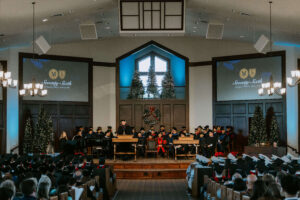
GCR terminology a CP disaster
RALEIGH, N.C. (BP)–The irony of life in the Southern Baptist corral is that for most of the past 30 years Southern Baptists have elected to national leadership men who did not demonstrate deep-seated, heartfelt, convictional support of the Southern Baptist Convention. Being a convention with a majority of small churches, bivocational pastors, rural roots and minimal theological education, we’ve almost always elected men from large churches with charisma who could look sharp and speak well on the national stage and make us feel good about the Southern Baptist image.
Call it validation by corporate image.
But for the most part these men were not involved in Southern Baptist life before their elections as national president, except for working behind the scenes toward the election of Southern Baptist Convention presidents. They were never seen in their local associations and seldom at their Baptist State Conventions. Instead, they were very busy growing large, outstanding churches.
With four exceptions, mission gifts from those churches to the Cooperative Program, which is the foundational lifeline for the work of Baptist State conventions and the Southern Baptist Convention, have consistently been two to four percent of undesignated receipts. This was at a time when the national average was closer to 10 percent of undesignated gifts from churches to the wider work.
Today, the national average from churches is closer to six percent and in large part that drop is due to the fact we have elected leadership who did not support the Cooperative Program. Nothing leads like example.
Most of these presidents’ churches have been very generous in other missions support. They respond to capital requests from the International Mission Board; give significant Lottie Moon and Annie Armstrong special offerings and send mission teams around the globe. That is important, honorable and noteworthy. I applaud it.
But the work of the Convention is the work of churches working cooperatively. When the example is that the cooperative work does not merit support, the result is diminished support.
Now we come to the work of the Great Commission Resurgence Task Force. There is no question Southern Baptists need self-examination. We need somehow to see the world and open our hearts to be moved by the Spirit of God enough to weep for it as Jesus wept for Jerusalem. From that heart change all Baptist issues would be resolved.
In its initial report the task force recognizes the heart issue. But no task force recommendation can order up a heart change like a happy meal. So the task force moves on to recommendations it can make in the structure of how Southern Baptists organize their work.
Several significant recommendations include phasing out cooperative agreements between state conventions and the North American Mission Board; cutting the SBC Executive Committee budget by one-third; having NAMB appoint missionaries directly; having NAMB operate from seven regional centers and erasing national boundaries –- including in the U.S. –- in which the International Mission Board should operate.
The issue here is Cooperative Program support because it is at the heart of the honest examination to get more resources to population centers in the U.S. and overseas. In the task force report is a recommendation to change nomenclature for cooperative giving to “Great Commission Giving” and include in that basket both gifts through the Cooperative Program and “any designated gifts given to the causes of the Southern Baptist Convention, a state convention or a local association.”
Men in line to be elected president of the Southern Baptist Convention resent when their church’s anemic Cooperative Program giving is cited as evidence of paltry SBC support. They are seeking to lead a billion dollar organization for which they’ve demonstrated little support or previous involvement. So they point to their thousands of dollars of other mission gifts and say those gifts should “count” if someone is tallying gifts as a measure of support.
The “Great Commission Giving” nomenclature suggested by the task force is a balm for their perceived injury. But it is a dressing for disaster as it concerns the Cooperative Program.
When the average CP giving of task force member churches is less than five percent the report’s recommendation to “reaffirm the Cooperative Program as our central means of supporting Great Commission ministries” rings hollow. Nothing leads like example.
The Cooperative Program as a vehicle for missions support needs national leaders to rise in support, not look for ways to give around it and get “credit.” Already the Cooperative Program is buffeted by 85 years of being taken for granted. It has become a faceless funnel for effective missions support at a time when every para-church organization puts faces and names to their appeals and our own International Mission Board is forced to make more than half the missionaries anonymous for safety’s sake.
There is much talk in the task force report of churches owning the Great Commission responsibility individually. That is a biblical mandate. But the work of the Southern Baptist Convention is the work of churches cooperatively.
Changing nomenclature adds not a dollar in effect or motivation to missions. But it will have the effect of sticking another drain in the vein of the Cooperative Program, to the demise of ministries North Carolina Baptists have birthed and nurtured for Jesus’ sake.
–30–
Norman Jameson is editor of the Biblical Recorder, the newsjournal of the Baptist State Convention of North Carolina.
For a BP article about the release of the GCR Task Force progress report, including the full text of the report, go to https://bpnews.net/bpnews.asp?id=32352.














